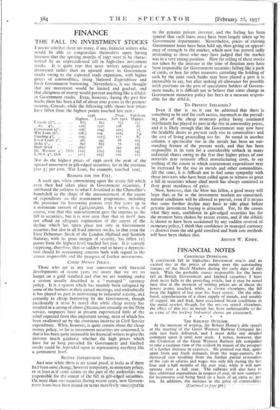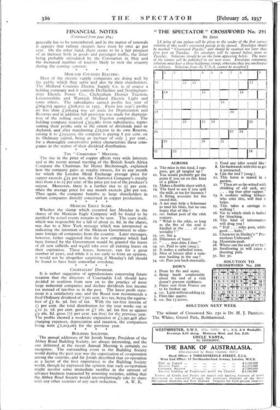FINANCIAL NOTES
CONTINUED DEPRESS ION.
A CONTINUED fall in high-class Investment stocks and an excited rise in the prices of metals were the outstanding features of the Stock Markets during the early days of this week. With the probable causes responsible for the heaiy fall in British Government and kindred securities I have dealt more fully in the preceding article, but it may be noted here that at the moment of writing prices are at about the lowest points touched, while, as shown elsewhere, the fall from the highest of last year has been severe. On the other hand, apprehensions of a short supply of metals, and notably of copper, tin and lead, have occasioned boom conditions in the metal market, though, for the reasons stated elsewhere, the effect of this rise in metals has been unfavourable so' far as some of the leading Industrial shares are concerned.
* *
THE RAILWAY OUTLOOK.
At the moment of writing, Sir Robert Home's able speech at the meeting of the Great Western Railway Company has only just been delivered, and I must defer any detailed comment upon it until next week. I notice, however, that the Chairman of the Great Western Railway felt compelled to take a cautious view of the outlook by reason of the prospect of a further increase in expenses. He pointed out that, quite apart from any fresh demands from the wage-earners, the increased cost resulting from the further partial restoration of the cuts in salaries and wages was only felt during the last four and a half months of the past year, while it will now operate over a full year The railways will also have to face additional expenditure in respect of coal, all new contracts for locomotive coal being fixed on a basis of an extra is. per ton. In addition, the increase in the price of -commodities
1Con-riintei oaf rage 386.)" • ' '
FINANCIAL NOTES
(Continued from page 384.)
generally has to be remembered, and in the matter of renewals it appears that railway sleepers have risen by over 4o per cent. On the other hand, there seems to be a fair prospect of an increase both in goods and passenger traffic, the latter being probably stimulated by the Coronation in May and the increased number of tourists likely to visit the country during the coming summer.
MIDLAND COUNTIES ELECTRIC.
Most of the electric supply companies are doing well by the public which they serve and also by their shareholders. The Midland Counties Electric Supply Co. is of course a holding company and it controls Derbyshire and Nottingham- shire Electric Power Co., Cheltenham District Traction, Leicestershire and Warwick Midland Electric Light and some others. The subsidiaries earned profits last year of £664,703 against £628,100 in 1935. From last year's profits no less than £306,954 was set aside for Depreciation and Reserves and in addition full provision was made for deprecia- tion of the rolling stock of the Traction companies. The holding company received £353,660 from subsidiaries, repre- senting their profits only to the extent of dividends paid or declared, and after transferring £25,000 to its own Reserve, raising it to £250,000, the company is paying 8 per cent. on its Ordinary capital, being an increase of only I per cent., for a thoroughly conservative policy characterises these com- panies in the matter of their dividend distribution.
* * * *
THE " CHARTERED " MEETING.
The rise in the price of copper affects very wide interests and at the recent annual meeting of the British South Africa Company the Chairman, Sir Henry Birchenough, explained how the company gains as royalty owners, for in any month for which the London Metal Exchange average price for copper exceeds £55 per ton, the Chartered Company's royalty rises from 2 to 21- per cent. of the price per ton of the producer's output. Moreover, there is a further rise to 24 per cent. when the average price for any month exceeds £60 per ton. Then again, the company benefits as large shareholders in
certain companies directly concerned in copper production.
* * * *
MEXICAN EAGLE SCARE.
Whether the slump which occurred last Monday in the shares of the Mexican Eagle Company will be found to be justified by actual events remains to be seen. The scare itself, which was responsible for a fall of about 5s. 6d. in the shares, was due to a New York message which was interpreted as indicating the intention of the Mexican Government to elim- inate foreign oil companies from the country. Later messages, however, rather suggested that the new company which had been formed by the Government would be granted the leases of all new oilfields and would take over all existing leases on their expiration. These leases, however, run for a great number of years, and while it is too early to form an opinion, it would not be altogether surprising if Monday's fall should be found to have been somewhat overdone.
* * * *
COURTAULDS' DIVIDEND.
It is rather suggestive of apprehensions concerning future taxation that the directors of Courtaulds Ltd. should have decided to conform from now on to the practice of most large industrial companies and declare dividends less income tax instead of tax-free as in the past. The latest profit state- ment is a satisfactory one, and the Board now recommends a final Ordinary dividend of 7 per cent. less tax, being the equiva- lent of £5 6s. 9d. free of tax. With the tax-free interim of 21 per cent. the total distribution for the year works out at £ro 5s. 7d. per cent. gross or £7 16s. 9d. tax free as against £9 i6s. 8d. gross (71 per cent. tax free) for the previous year. The profits showed a moderate expansion at £2,391,458 after charging expenses, depreciation and taxation, the comparison
being with £2,2o3,o63 for the previous year.
* * * * BUILDING SOCIETIES.
The annual addresses of Sir Josiah Stamp, President of the Abbey Road Building Society, are always interesting, and the one delivered at the recent Annual Meeting is certainly no exception. The outstanding event in the Building Society world during the past year was the organisation of co-operation among the societies, and Sir Josiah described that co-operation as a factor of the first importance in the Building Society world, though he expressed the opinion that such co-operation might involve some immediate sacrifice in the amount of advance business transacted by assenting societies, adding that the Abbey Road Society would uncomplainingly take its share
with any other societies of any such reduction. A. W. K.



















































 Previous page
Previous page